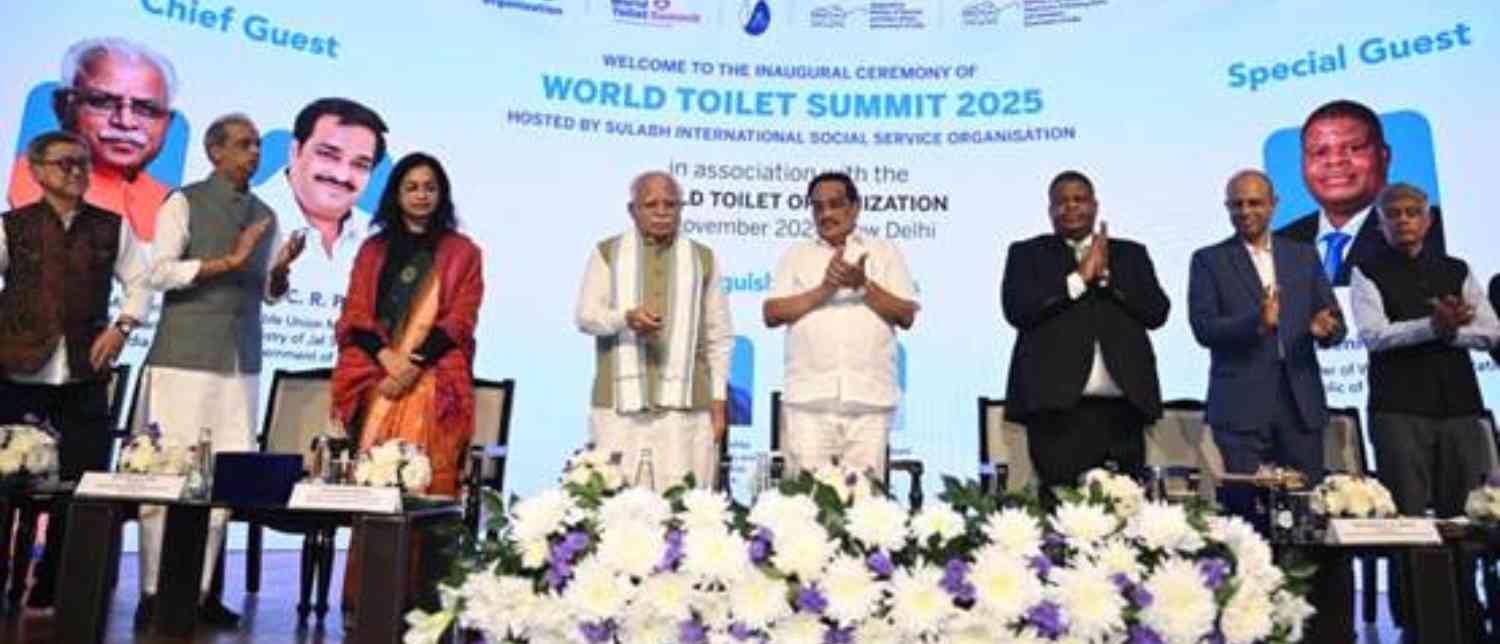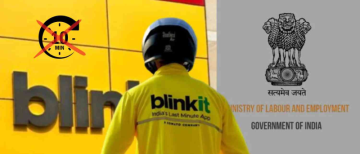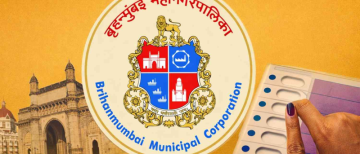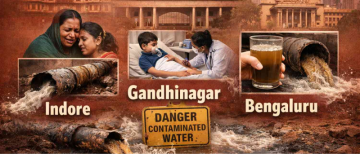World Toilet Day 2025 unfolded with a renewed energy across India and the global sanitation community, spotlighting the theme “Sanitation: Collective Responsibility for Dignity and Planet.” The theme reflects India’s integrated approach to sanitation—an approach that merges dignity, cleanliness, environmental stewardship, and innovation. It also mirrors the vision of Hon’ble Prime Minister Shri Narendra Modi, under whose leadership the country has made unprecedented strides in achieving universal access to safe sanitation.
The observance of the day saw the Ministry of Housing and Urban Affairs (MoHUA) launch two major nationwide advocacy drives—‘Toilet Paas Hai’ and ‘Main Saaf Hi Achha Hoon’—aimed at championing responsible toilet use and strengthening hygiene practices in communities. The occasion also marked the opening of the 3-day World Toilet Summit 2025 in New Delhi, jointly organized by Sulabh International, World Toilet Organization, MoHUA, and the Department of Drinking Water and Sanitation (DDWS). With delegates from 25 countries, key global organizations like the World Bank and Bill & Melinda Gates Foundation, and industry leaders such as HUL, the summit set the stage for global dialogue on circular economy practices and sustainable sanitation systems.
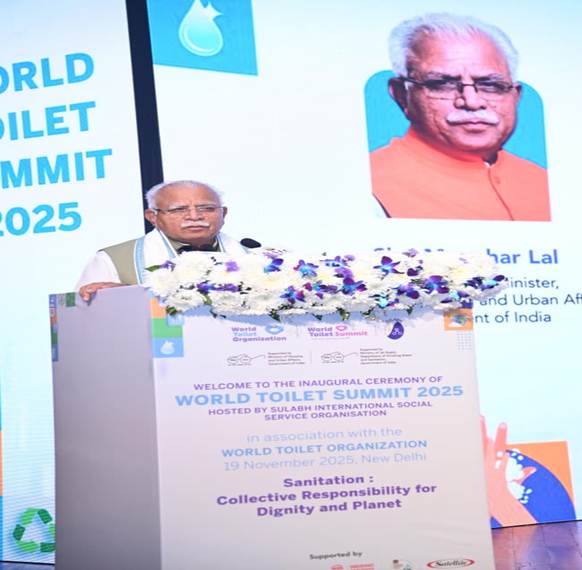
India’s Sanitation Journey: From A Historic Mission to a Sustainable Future
When Prime Minister Modi issued a clarion call for “swachhata” in 2014 under the Swachh Bharat Mission, it marked the beginning of a nationwide transformation. Within just five years, India achieved what many considered impossible—the nation was declared Open Defecation Free (ODF) in 2019, a milestone that uplifted cleanliness, safety, dignity, and access to education for millions, especially women and girl students.
But the journey did not end at ODF.
Urban Challenges Amid Growth and Climate Pressures
With rapid urbanization, rising migration, and growing city populations, sanitation needs have expanded dramatically. Public toilets, wastewater systems, and waste-management structures now carry heavier loads than ever before. Climate change—through extreme rainfall, flooding, and ecosystem disturbance—is intensifying these pressures on WASH (Water, Sanitation, and Hygiene) systems globally.
The United Nations’ Sustainable Development Goal 6 (SDG-6) recognizes clean water and sanitation as fundamental human rights—a goal India continues to actively accelerate through policy, innovation, partnerships, and on-ground action.
SBM-U 2.0: Taking Sanitation from ODF to ODF++ and Beyond
The launch of Swachh Bharat Mission–Urban (SBM-U) 2.0 marked a new chapter in India’s sanitation evolution. This phase focuses not just on access but on safe sanitation, efficient faecal sludge management, and climate-resilient systems.
Under SBM-U 2.0, the goal expanded from achieving ODF to ensuring:
-
ODF+ – functionality and maintenance of community and public toilets
-
ODF++ – safe management and treatment of faecal sludge and sewage
As cities expanded, the demand for quality public toilets skyrocketed. Strengthening urban sanitation infrastructure became a priority, requiring innovative design, durable systems, and sustainable waste-management solutions.
55 Million Newly Served with Safe Sanitation
According to the 2024 WHO-UNICEF Joint Monitoring Programme (JMP) report, nearly 55 million urban residents in India have gained access to safely managed, improved sanitation facilities in just two years—a population equivalent to France or Italy. These improved services have also contributed to a significant drop in infant and under-five mortality rates.
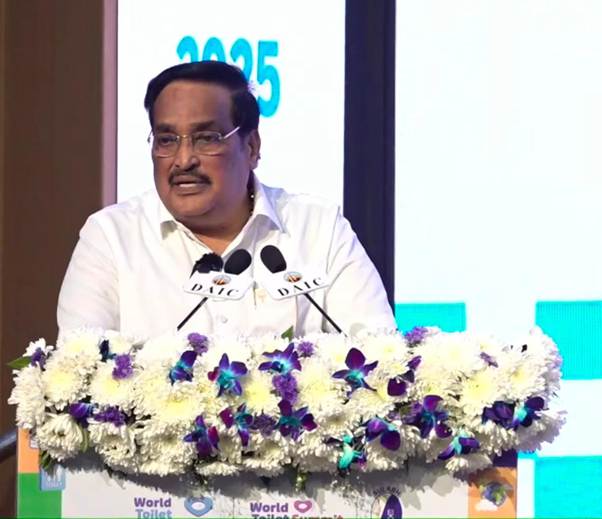
Region-Specific Innovations and Multi-Mission Convergence
Recognizing India’s vast and diverse geography, MoHUA has worked closely with missions like AMRUT and Namami Gange to develop region-specific sanitation solutions. These include:
-
implementing sewage treatment facilities along rivers and coastlines
-
supporting sanitation systems tailored to challenging terrains
-
enhancing wastewater management with environmental safeguards
Several startups have been engaged to bring innovative, tech-enabled sanitation solutions. Complementing these efforts, the Ministry launched:
-
Swachhata Startup Challenge – to promote sanitation technologies
-
Toilet Design Challenge – to encourage architectural innovation in toilet construction
Strengthening Institutions Through Strategic Partnerships
Institutional capacity-building remains central to SBM-U 2.0. In 2024, MoHUA signed major MoUs to support sanitation expansion and maintenance:
-
A partnership with HUL to develop PPP (Public–Private Partnership) models for community toilets.
-
A collaboration with Sulabh International to support construction and efficient upkeep of public toilets in high-footfall zones.
Urban Local Bodies (ULBs) across India have been encouraged to expand public toilet infrastructure, particularly at tourist attractions, religious hubs, and busy public areas. Such facilities are now being designated as “Aspirational Toilets”—modern structures designed to deliver superior user experience and long-term operational sustainability.
So far, 29,000 Aspirational Toilet seats have been approved under SBM-U 2.0.
Aspirational Toilets: Modern, Inclusive, and Environmentally Sustainable
The Aspirational Toilet initiative aims to redefine what public sanitation can be—clean, accessible, and user-friendly. These toilets include:
-
smart amenities and advanced design systems
-
inclusive, accessible infrastructure for persons with disabilities
-
gender-neutral and child-friendly features
-
environmentally sustainable technologies like water-saving fixtures and waste-to-resource applications
On World Toilet Day 2025, several Aspirational Toilets were inaugurated across India.
In Indore, Mayor Pushyamitra Bhargav and Commissioner Dilip Kumar Yadav inaugurated a newly built public toilet at Nehru Park.
In Lucknow, Mayor Smt. Sushma Kharkwal opened a modern public facility near Chowk Stadium, with city officials, councillors, and citizens attending the event.
World Toilet Summit 2025: A Global Gathering for Sustainable Sanitation
The inaugural session of the World Toilet Summit 2025 saw participation from:
-
Union Minister for Housing and Urban Affairs Shri Manohar Lal
-
Union Minister for Jal Shakti Shri C.R. Patil
-
Deputy Minister David Mahlobo (South Africa)
-
Ambassadors of Sri Lanka and Bhutan
-
Representatives from 25 nations
-
Leading institutions including HUL, BMGF, and the World Bank
Key Messages from the Summit
Shri Manohar Lal emphasized the need for collective global action on cleanliness and sustainability. He noted that sanitation is evolving rapidly in India and worldwide, remarking:
“Cleanliness is not judged by a tidy home or bedroom, but by the condition of one’s toilet.”
He highlighted priorities such as:
-
wastewater treatment
-
promoting reuse and circularity
-
building climate-positive sanitation systems
-
nurturing early sanitation habits in children
-
accelerating behavioural change
Union Minister Shri C.R. Patil stressed how toilet access has transformed women’s lives, leading to greater dignity, safety, and empowerment. He underlined that rural sanitation has saved nearly 3 lakh children each year by preventing diarrhoeal deaths.
New National Campaigns Launched: ‘Toilet Paas Hai’ & ‘Main Saaf Hi Achha Hoon’
Marking World Toilet Day, MoHUA unveiled two major national initiatives:
1. ‘Toilet Paas Hai’
A campaign designed to help citizens easily locate accessible public toilets.
This supports improved usability, convenience, and awareness of available sanitation facilities.
2. ‘Main Saaf Hi Achha Hoon’
A year-long advocacy drive to promote responsible toilet use, cleanliness, and hygiene habits among communities.
The Ministry also released:
-
detailed advisories for ULBs
-
technical guidelines on public toilet design
-
the CT&PT Guide addressing common design gaps
-
intent formats for cities on HUL-Suvidha Centres
-
behaviour change modules for early childhood sanitation education, including the “Swachh Aadatein – 21 Dinon ka Swachh Aadat Prashikshan Pathyakram”
A Roadmap for the Future: Innovation, Dignity, and Circularity
Over the remaining two days of the Summit, global and Indian stakeholders will deliberate on:
-
circular economy and climate-positive sanitation
-
financing models for sustainable sanitation infrastructure
-
inclusive design, construction, and O&M of sanitation systems
-
cutting-edge technology solutions
-
capacity building for ULBs
-
strengthening safety and dignity of SafaiMitras
These discussions aim to chart a clear roadmap for future-ready sanitation systems that are safer, more inclusive, and more environmentally resilient.
India Reaffirms Global Leadership in Sanitation
World Toilet Day 2025 reaffirms that sanitation is not merely about infrastructure—it is about dignity, environmental protection, climate resilience, and societal progress. India’s approach continues to set benchmarks for the world, blending policy, people’s participation, technology, and innovation.
With its unwavering commitment and collaborative spirit, India is championing a future where safe sanitation is accessible to all and aligned respectfully with the health of the planet.
With inputs from agencies
Image Source: Multiple agencies
© Copyright 2025. All Rights Reserved. Powered by Vygr Media.

